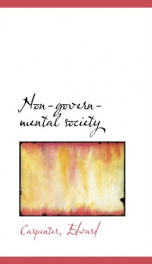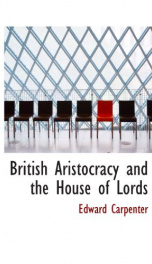Carpenter Edward
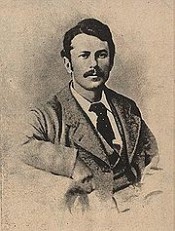
Edward Carpenter (29 August 1844 – 28 June 1929) was an English socialist poet, anthologist, early gay activist and socialist philosopher. A leading figure in late 19th- and early 20th-century Britain, he was instrumental in the foundation of the Fabian Society and the Labour Party. A poet and writer, he was a close friend of Walt Whitman and Rabindranath Tagore, corresponding with many famous figures such as Annie Besant, Isadora Duncan, Havelock Ellis, Roger Fry, Mahatma Gandhi, James Keir Hardie, J. K. Kinney, Jack London, George Merrill, E D Morel, William Morris, E R Pease, John Ruskin, and Olive Schreiner.[1] As a philosopher he is particularly known for his publication of Civilisation, its Cause and Cure in which he proposes that civilisation is a form of disease that human societies pass through. Civilisations, he says, rarely last more than a thousand years before collapsing, and no society has ever passed through civilisation successfully. His 'cure' is a closer association with the land and greater development of our inner nature. Although derived from his experience of Hindu mysticism, and referred to as 'mystical socialism', his thoughts parallel those of several writers in the field of psychology and sociology at the start of the twentieth century, such as Boris Sidis, Sigmund Freud, and Wilfred Trotter who all recognised that society puts ever increasing pressure on the individual that can result in mental and physical illnesses such as neurosis, and the particular nervousness which was then described as neurasthenia. A strong advocate of sexual freedom, living in a gay community near Sheffield, he had a profound influence on both D. H. Lawrence and E. M. Forster. Born in Hove, near Brighton, Carpenter was educated at Brighton College. When he was ten, he displayed a flair for the piano. During these formative years, he spent his free time horse-riding or walking. This simple life instilled in him a love of nature that would be lifelong. His academic talent appeared relatively late in his youth, but was prolific enough to earn him a place at Trinity Hall, Cambridge.[2] Whilst there he began to experiment with his feelings for men. One of the most notable examples of this is his close friendship with Edward Anthony Beck (later Master of Trinity Hall), which, according to Carpenter, had "a touch of romance". Beck eventually ended their relationship and denied the attachment, causing Carpenter great emotional heartache. Carpenter's sense of rejection mirrored his general unease with his sexuality, causing him to visit male prostitutes in Paris. Carpenter graduated as 10th Wrangler in 1868.[3] After university he joined the Church of England as a curate, "as a convention rather than out of deep Conviction".[4] He was heavily influenced by the minister at his church, Frederick Maurice, who was the leader of the Christian Socialist movement. In the following years he experienced an increasing sense of dissatisfaction with his life in the church and university and became weary of what he saw as the hypocrisy of Victorian society. He found great solace in reading poetry, later remarking that his discovery of the work of the gay, politically-radical Walt Whitman caused "a profound change" in him. (My Days and Dreams p. 64) Reading Whitman caused Carpenter to reject a life spent in a comfortable clerical post and instead he wished to dedicate himself to life helping the working-class gain the right to education. Carpenter left the church in 1874 and became a lecturer in astronomy, sun worship, the lives of ancient Greek women and music, moving to Leeds as part of University Extension Movement, which was formed by academics who wished to introduce higher education to deprived areas of England. He hoped to lecture to the working classes, but found that his lectures were attended by middle class people, many of whom showed little active interest in the subjects he taught. Disillusioned, he moved to Chesterfield, but finding that town dull, he based himself in nearby Sheffield a year later.[2] Here he finally came into contact with manual workers, and he began to write poetry. Despite his obvious affinity for labourers, he was invited to become a tutor to the future George V. He politely declined the post. In Sheffield, Carpenter became increasingly radical. Influenced by a disciple of Engels, Henry Hyndman, he joined the Social Democratic Federation (SDF) in 1883 and attempted to form a branch in the city. The group instead chose to remain independent, and became the Sheffield Socialist Society. While in the city he worked on a number of projects including highlighting the poor living conditions of industrial workers. In May 1889, Carpenter wrote a piece in the Sheffield Independent calling Sheffield the laughingstock of the civilized world and said that the giant thick cloud of smog rising out of Sheffield was like the smoke arising from Judgment Day, and that it was the altar on which the lives of many thousands would be sacrificed. He said that 100,000 adults and children were struggling to find sunlight and air, enduring miserable lives, unable to breathe and dying of related illnesses. Also while in Sheffield he wrote "England Arise!", a socialist marching song to promote left-wing politics, rivalling Connell's "Red Flag" in the British Labour Movement. In 1884, he left the SDF with William Morris to join the Socialist League. This move was in part promoted by the more conventional political aspirations of the SDF, a feeling made obvious by Hyndman, who in 1881 remarked, "I do not want the movement to be a depository of old cranks, humanitarians, vegetarians, anti-vivisectionists, and anti-vaccinationists, arty-crafties and all the rest of them." Increasingly attracted by a life close to nature, Carpenter moved in with tenant farmer Albert Fearnehough and his family in Bradway, then in Derbyshire. It was here that Carpenter began to develop the crux of his Socialist politics. Influenced by John Ruskin, he envisioned a future that took the form of primitive communism, which flatly rejected the industrialism of the Victorian age. In this utopian community he envisaged "mutual help and combination will...become spontaneous and instinctive". When his father Charles Carpenter died in 1882, he left his son a considerable fortune. This enabled Carpenter to quit his lectureship to start a simpler life of market gardening in Millthorpe, near Barlow in Derbyshire. By this time he fully acknowledged his sexual orientation, and this, along with the ending of many of his conventional family ties (his mother died in 1881) and his adoption of a life closer to nature, produced a period of artistic creativity. Carpenter wrote, in a "kind of wooden sentinel box" in his garden, the poems that would become his book of verse, Towards Democracy, which was heavily influenced by Eastern spirituality and Carpenter's long reading of the writings of Walt Whitman. During 1886, he had a brief relationship with George Hukin, who was employed in the Sheffield razor trade; despite Hukin's subsequent marriage, which caused a rift between them, the men ultimately formed a close and lifelong friendship. In the 1880s Carpenter developed an intellectual passion for Hindu mysticism and Indian philosophy. During this period, Carpenter received a pair of sandals from a friend in India. "I soon found the joy of wearing them", Carpenter wrote. "And after a little time I set about making them." This was the first successful introduction of sandals to Britain. In 1890 he travelled to Ceylon and India to spend time with the Hindu teacher called Gnani, who he describes his work Adam's Peak to Elephanta. The experience had a profound effect on his social and political thought. Carpenter began to believe that Socialism should not only concern itself with man's outward economic conditions, but also affect a profound change in human consciousness. In this new stage of society Carpenter argued that mankind would return to a primordial state of simple joy: "The meaning of the old religions will come back to him. On the high tops once more gathering he will celebrate with naked dances the glory of the human form and the great processions of the stars, or greet the bright horn of the young moon." (Edward Carpenter (1889) Civilisation: its cause and cure) This brand of "Mystical socialism" inspired him to begin a number of campaigns against air pollution, promoting vegetarianism and opposing vivisection. On his return from India in 1891, he met George Merrill, a working class man also from Sheffield, and the two men struck up a relationship, eventually moving in together in 1898.[2] Merrill had been raised in the slums of Sheffield and had no formal education. Their relationship endured and they remained partners for the rest of their lives, a fact made all the more extraordinary by the hysteria about alternative sexualities generated by the Oscar Wilde trial of 1895 and the Criminal Law Amendment Bill passed a decade earlier "outlawing all forms of male homosexual contact". Their relationship not only defied Victorian sexual mores but also the highly stratified British class system. Their partnership, in many ways, reflected Carpenter's cherished conviction that same-sex love had the power to subvert class boundaries. It was his belief that at sometime in the future, gay people would be the cause of radical social change in the social conditions of man. Carpenter remarks in his work The Intermediate Sex: "Eros is a great leveller. Perhaps the true Democracy rests, more firmly than anywhere else, on a sentiment which easily passes the bounds of class and caste, and unites in the closest affection the most estranged ranks of society. It is noticeable how often Uranians of good position and breeding are drawn to rougher types, as of manual workers, and frequently very permanent alliances grow up in this way, which although not publicly acknowledged have a decided influence on social institutions, customs and political tendencies."[5] (Note: The term "Uranian", referring to a passage from Plato's Symposium, was often used at the time to describe someone who would be termed "gay" nowadays. Carpenter is counted among the Uranians[6] himself.)
do you like this author?
What readers are saying
What do you think? Write your own comment on this book!
write a commentWhat readers are saying
What do you think? Write your own comment on this author!
write a commentBook list
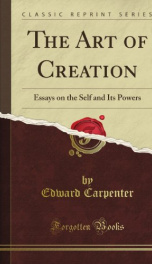
the art of creation essays on the self and its powers
Series:
Unknown
Year:
Unknown
Raiting:
2.5/5
Related Motion seems to be, as suggested by the words Attraction and Repulsion, Gravitation, Chemical Affinity, and so forth, the ground-fact of inorganic Nature. And it seems also to be the ground and foundation of Life. The protoplasmic jelly moves towards or away from substances in its neighborhood, and this appears to be its fundamental property. The most primitive cellular organisms act in the same way. Some seek light, others flee from it. Paramecium is drawn towards slightly acid substances, and flies from alkalies. Actynophrys is attracted by starch; and so on.1 There appears to be a kind of ' choice' or elective affinity; and the learned are divided on the subject into two schools-those who, like Binet, see in these movements of protozoa the germinal characteristics of human intelligence, and those who class them as " merely chemical" and automatic reactions.Table of Contents Preface vii; I Preliminary i; II The Art of Creation io; III Matter and Consciousness , , , -35; Note on Matter 45; IV The Three Stages of Consciousness 54 V The Self and its Affiliations 71; VI The Self and its Affiliations (continued) 92; Note on the Great Sympathetic 113 VII Platonic Ideas and Heredity 118 VIII The Gods as Apparitions of the Race-Life 135 IX The Gods as Dwelling in the Physiological; Centres 154; X The Devils and the Idols 174; XI Beauty and Duty192; XII Creation , 208; XIII, Transformation 223; APPENDIX; 1 The May-Fly: a Study in Transformation 237; 2 Health a Conquest 255; 3 Evening in Spring ; a Meditation 263About the Publisher Forgotten Books is a publisher of historical writings, such as: Philosophy, Classics, Science, Religion, History, Folklore and Mythology.Forgotten Books' Classic Reprint Series utilizes the latest technology to regenerate facsimiles of historically important writings. Careful attention has been made to
Show more
add to favoritesadd In favorites
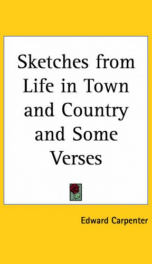
sketches from life in town and country and some verses
Series:
Unknown
Year:
Unknown
Raiting:
4/5
Found in this volume are short essays and verses by Carpenter. Sample contents: Martin Turner; Narayan, a tale of Indian life; Saxon household; country pub; couple of Communists; saved by a nose, a bit of autobiography; fellowship of humanity; artist to his lady; Genoa; Beethoven; going to school; England, Arise!; and many others.
Show more
add to favoritesadd In favorites
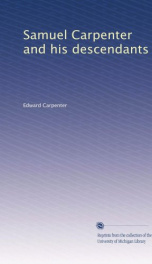
samuel carpenter and his descendants
Series:
Unknown
Year:
Unknown
Raiting:
3.5/5
This is a reproduction of the original edition including imperfections. Included with the purchase of this book is free trial access to Million-Books.com where you can read more than a million books for free, including many of the greatest books of all time like: * The complete works of Shakespeare, Charles Dickens, Mark Twain * Swift's Gulliver's Travels * Defoe's Robinson Crusoe * Thackeray's Vanity Fair * Jane Austen's Sense and Sensibility and Pride and Prejudice * Sigmund Freud's Interpretation of Dreams * Albert Einstein's Relativity * F. Scott Fitzgerald's Great Gatsby * George Orwell's 1984 * Milton's Paradise Lost * Smith's Wealth of Nations * Darwin's Origin of Species * Aristotle's Ethics * Plato's Dialogues * Thos. Ã Kempis' Imitation of Christ * Hume's History of England * Carlyle's French Revolution * Gibbon's Decline and Fall of the Roman Empire * . . .and more than a million more books These books have been a source of inspiration, joy and enlightenment to millions through the ages. Now they can all be yours. --This text refers to an out of print or unavailable edition of this title.
Show more
add to favoritesadd In favorites
Book list

the art of creation essays on the self and its powers
Series:
Unknown
Year:
Unknown
Raiting:
2.5/5
Related Motion seems to be, as suggested by the words Attraction and Repulsion, Gravitation, Chemical Affinity, and so forth, the ground-fact of inorganic Nature. And it seems also to be the ground and foundation of Life. The protoplasmic jelly moves towards or away from substances in its neighborhood, and this appears to be its fundamental property. The most primitive cellular organisms act in the same way. Some seek light, others flee from it. Paramecium is drawn towards slightly acid substances, and flies from alkalies. Actynophrys is attracted by starch; and so on.1 There appears to be a kind of ' choice' or elective affinity; and the learned are divided on the subject into two schools-those who, like Binet, see in these movements of protozoa the germinal characteristics of human intelligence, and those who class them as " merely chemical" and automatic reactions.Table of Contents Preface vii; I Preliminary i; II The Art of Creation io; III Matter and Consciousness , , , -35; Note on Matter 45; IV The Three Stages of Consciousness 54 V The Self and its Affiliations 71; VI The Self and its Affiliations (continued) 92; Note on the Great Sympathetic 113 VII Platonic Ideas and Heredity 118 VIII The Gods as Apparitions of the Race-Life 135 IX The Gods as Dwelling in the Physiological; Centres 154; X The Devils and the Idols 174; XI Beauty and Duty192; XII Creation , 208; XIII, Transformation 223; APPENDIX; 1 The May-Fly: a Study in Transformation 237; 2 Health a Conquest 255; 3 Evening in Spring ; a Meditation 263About the Publisher Forgotten Books is a publisher of historical writings, such as: Philosophy, Classics, Science, Religion, History, Folklore and Mythology.Forgotten Books' Classic Reprint Series utilizes the latest technology to regenerate facsimiles of historically important writings. Careful attention has been made to
Show more
add to favoritesadd In favorites

sketches from life in town and country and some verses
Series:
Unknown
Year:
Unknown
Raiting:
4/5
Found in this volume are short essays and verses by Carpenter. Sample contents: Martin Turner; Narayan, a tale of Indian life; Saxon household; country pub; couple of Communists; saved by a nose, a bit of autobiography; fellowship of humanity; artist to his lady; Genoa; Beethoven; going to school; England, Arise!; and many others.
Show more
add to favoritesadd In favorites

samuel carpenter and his descendants
Series:
Unknown
Year:
Unknown
Raiting:
3.5/5
This is a reproduction of the original edition including imperfections. Included with the purchase of this book is free trial access to Million-Books.com where you can read more than a million books for free, including many of the greatest books of all time like: * The complete works of Shakespeare, Charles Dickens, Mark Twain * Swift's Gulliver's Travels * Defoe's Robinson Crusoe * Thackeray's Vanity Fair * Jane Austen's Sense and Sensibility and Pride and Prejudice * Sigmund Freud's Interpretation of Dreams * Albert Einstein's Relativity * F. Scott Fitzgerald's Great Gatsby * George Orwell's 1984 * Milton's Paradise Lost * Smith's Wealth of Nations * Darwin's Origin of Species * Aristotle's Ethics * Plato's Dialogues * Thos. Ã Kempis' Imitation of Christ * Hume's History of England * Carlyle's French Revolution * Gibbon's Decline and Fall of the Roman Empire * . . .and more than a million more books These books have been a source of inspiration, joy and enlightenment to millions through the ages. Now they can all be yours. --This text refers to an out of print or unavailable edition of this title.
Show more
add to favoritesadd In favorites

prisons police and punishment an inquiry into the causes and treatment of crim
Series:
Unknown
Year:
Unknown
Raiting:
3.5/5
Show more
add to favoritesadd In favorites

pagan christian creeds their origin and meaning
Series:
Unknown
Year:
Unknown
Raiting:
3/5
Show more
add to favoritesadd In favorites

my days and dreams
Series:
Unknown
Year:
Unknown
Raiting:
3/5
Originally published in 1914. This volume from the Cornell University Library's print collections was scanned on an APT BookScan and converted to JPG 2000 format by Kirtas Technologies. All titles scanned cover to cover and pages may include marks, notations and other marginalia present in the original volume.
Show more
add to favoritesadd In favorites
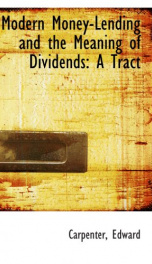
modern money lending and the meaning of dividends a tract
Series:
Unknown
Year:
Unknown
Raiting:
4/5
Show more
add to favoritesadd In favorites
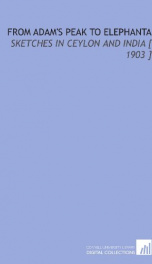
from adams peak to elephanta sketches in ceylon and india
Series:
Unknown
Year:
Unknown
Raiting:
4.5/5
Originally published in 1903. This volume from the Cornell University Library's print collections was scanned on an APT BookScan and converted to JPG 2000 format by Kirtas Technologies. All titles scanned cover to cover and pages may include marks notations and other marginalia present in the original volume.
Show more
add to favoritesadd In favorites
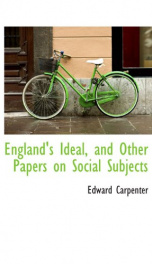
englands ideal and other papers on social subjects
Series:
Unknown
Year:
Unknown
Raiting:
3.5/5
Purchase of this book includes free trial access to www.million-books.com where you can read more than a million books for free. This is an OCR edition with typos. Excerpt from book: DESIRABLE MANSIONS. " The Widow Douglas, she took me for her son, and allowed she would civilise me ; but it was rough living in the house all the time, considering how dismal regular and decent the widow was in all her ways ; and so when I couldn't stand it no longer I lit out."âtextit{Mark Twain. After all, why should we rail against the rich ? I think if anything they should be pitied. In nine cases out of ten it is not a man's fault. He is born in the lap of luxury, he grows up surrounded by absurd and impossible ideas about life, the innumerable chains of habit and circumstance tighten upon him, and when the time comes that he would escape, he finds he cannot. He is condemned to flop up and down in his cage for the remainder of his daysâa spectacle of boredom, and a warning to gods and men. I go into the houses of the rich. In the drawing- room I see chill weary faces, peaked features of ill- health ; downstairs and in the kitchen I meet with rosy smiles, kissable cheeks, and hear sounds of song and laughter. What is this ? Is it possible that the real human beings live with James below-stairs ! Often as I pass and see in suburb or country some " desirable mansion " rising from the ground, I think: That man is building a prison for himself. So it isâa prison. I would rather spend a calendar month in Clerkenwell or Holloway than I would in that desirable mansion. A young lady that I knew, and who lived in such a mansion, used with her sisters to teach a class of factory girls. Every now and again one of the girls would say, " Eh, Miss, how I would like to be a grand lady like you ! " Then she would answer, " Yes, but you wouldn't be able to do everything you liked ; for instance, you wouldn't be allowed to go out walking when you liked.1' " Eh, dear !" they would s... --This text refers to an alternate Paperback edition.
Show more
add to favoritesadd In favorites
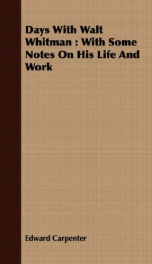
days with walt whitman with some notes on his life and work
Series:
Unknown
Year:
Unknown
Raiting:
4/5
This volume is dedicated to Walt Whitman, a 19th century writer whose life's work, Leaves of Grass, made him one of the first American poets to gain international attention. By Edward Carpenter (1844 – 1929) was an English socialist poet, anthologist, and early gay activist and socialist philosopher.
Show more
add to favoritesadd In favorites
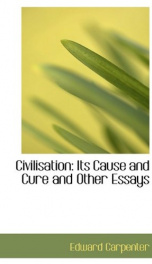
civilisation its cause and cure and other essays
Series:
Unknown
Year:
Unknown
Raiting:
5/5
Originally published in 1921. This volume from the Cornell University Library's print collections was scanned on an APT BookScan and converted to JPG 2000 format by Kirtas Technologies. All titles scanned cover to cover and pages may include marks notations and other marginalia present in the original volume.
Show more
add to favoritesadd In favorites

Pagan and Christian creeds: their origin and meaning
Series:
Unknown
Year:
Unknown
Raiting:
5/5
Show more
add to favoritesadd In favorites
What readers are saying
What do you think? Write your own comment on this author!
write a commentGenre
- Literature & Fiction
- Outdoors & Nature / Ecology
- Computers & Internet / Home Computing / Internet
- Nonfiction / Education / Education Theory / History
- Books / Christianity and other religions
- Books / Big game hunting / Kenya
- Books / Poets, American / 19th century / Biography
- Reference / Atlases & Maps / World
- Medicine / India
if you like Carpenter Edward try:
readers also enjoyed
What readers are saying
What do you think? Write your own comment on this author!
write a commentGenre
- Literature & Fiction
- Outdoors & Nature / Ecology
- Computers & Internet / Home Computing / Internet
- Nonfiction / Education / Education Theory / History
- Books / Christianity and other religions
- Books / Big game hunting / Kenya
- Books / Poets, American / 19th century / Biography
- Reference / Atlases & Maps / World
- Medicine / India
if you like Carpenter Edward try:
readers also enjoyed
Do you want to read a book that interests you? It’s EASY!
Create an account and send a request for reading to other users on the Webpage of the book!
